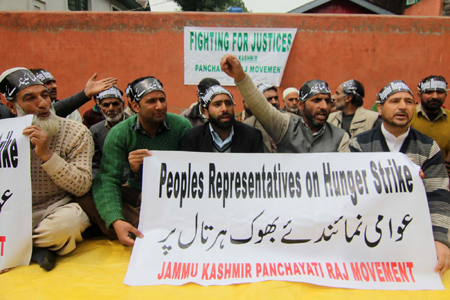as Sarpanchs. As militants started training their guns – more than 30 were killed, hordes travelled to Srinagar to publish their resignations in newspaper spaces they bought. Barely half of the segments in Kashmir had an election.
All the 2710 Panchayats were dissolved on August 11, 2006, almost a month after their term expired and their powers vested with executives at block level. The only major lesson that was learnt was that nominating women to the PRS did not work. Only 246 women Sarpanchs and Panchs were elected against 20548 Panchs and 2700 Sarpanchs across J&K. It was decided that segments need to be reserved for women, a change that was effected through an amendment later. As per the system in vogue, every Panchayat will be reserved for women, once in three elections.

Panchayat elections were announced many times but not held for one or the other reason. After continued unrest for three successive summers, when the government finally decided to hold the Panchayat polls in 2011, it proved an astounding success with more than 78% voters participating. The elected Panchs and Sarpanchs were formally notified by the government on July 14, 2011.
This time, there were not many gaps. From Kashmir, 39 positions of Sarpanchs were vacant when the results were notified. So were 1361 Panch berths. The number of vacancies might have increased, by now, because of natural deaths, militant attacks and resignations that the government repeatedly said it will not accept. “These (resignations) are just options to ease pressure,” Chief Minister Omar Abdullah said. “We are not accepting them (as resignations).”
But the real crisis was somewhere else. Polls were held for 4130 Sarpanchs (2164 in Kashmir and 1966 in Jammu) and 29,719 Panchs (15,959 in Kashmir and 13,760 in Jammu) and the outcome was election of a full ‘division’ of Panchs – nearly 35000. Managing them and the institutions they represent is still a major issue with and for the government. Even though the government is consistently insisting that it has transferred funds, functions and the facilities to the PRS, the elected lot is claiming it was deliberately being disempowered. They have actually launched a state wide campaign to get their rights restored.
But holding Panchayat elections was just part of the process. The two other tiers based on the PRS were supposed to be in place within three months. It has already been 15 months, now. Last week, the government finally decided to hold polls for the second tier. Notification was issued. As things started moving, the cabinet in an emergency meeting decided to withdraw the notification. Had it not been done, the BDCs would have been in place by the end of first week of November. There are 143 BDCs – 18 in Ladakh, 59 in Kashmir and 66 in Jammu, and they were to be elected by 33,500 Sarpanchs and Panchs.
The coalition government was under intense pressure from within over the issue of empowering PRS. Omar made it public that lawmakers including two cabinet ministers had visited him advising against empowering the PRS, especially at tier-II. Most of the 79 lawmakers may not be supportive of the idea that their sole activity will reduce to mere lawmaking as most of the vital developmental activities will go to the Panchayat at Halqa level and BDCs at the block level. Most basic schemes will be operated by the Panchayats as the BDCs and district development boards will fix the priorities of the overall development. All elected members of assembly, council, Lok Sabha and Rajya Sabha are members of the district boards, a role they will retain.
But the government had no reason for inordinately delaying the empowerment of Panchayats and constitution of the two other tiers. It was Congress that made it easy. While Soz was continuously involved in the issue, the last push came from Ghulam Nabi Azad who said the BDC elections would mean nothing without incorporating the spirit of the twin amendments to the constitution of India. Congress has been seeking incorporating the twin amendments of the Indian constitution to the state Panchayat law so that there are adequate reservations for different classes and categories and the district development and planning board becomes an elected authority. Adopting these changes suo moto was always impossible but copying the spirit and incorporating it was legitimate and possible. Under the existing law – in contravention of the 73rd amendment, the district development and planning board would continue to be headed by a minister nominated by the state government as the elected head of the PRS at the district level will be the co-chairman.















